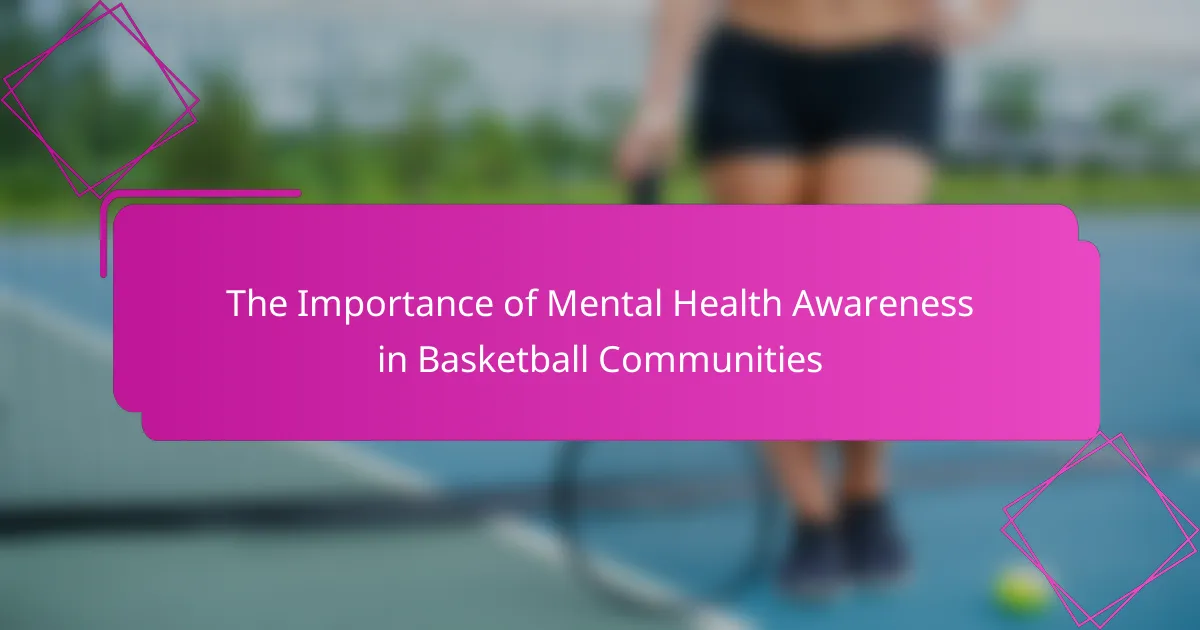Mental health awareness is essential for enhancing player performance and well-being in basketball communities. Recognizing mental health issues enables early intervention and fosters a supportive environment. Organizations like the NBA and NCAA are actively promoting resources and initiatives to reduce stigma. Understanding cultural perceptions and integrating mental health education into training can significantly improve team dynamics and resilience.
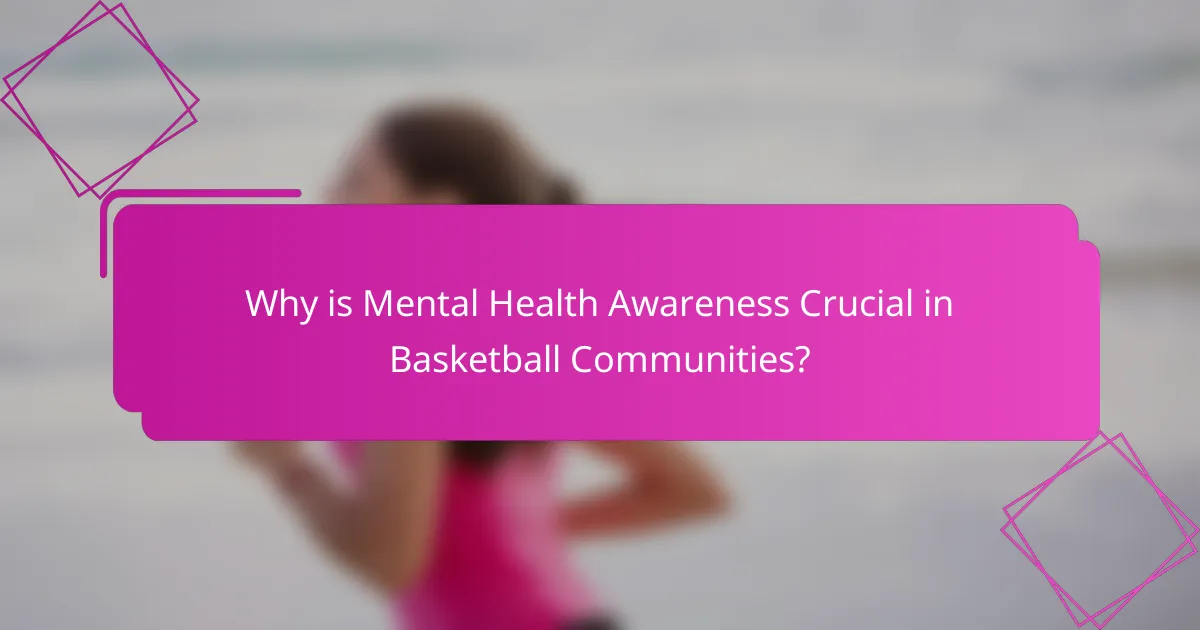
Why is Mental Health Awareness Crucial in Basketball Communities?
Mental health awareness is crucial in basketball communities to support players’ overall well-being and performance. Recognizing mental health issues can lead to early intervention, fostering a healthier environment. Studies show that athletes with strong mental health resources are more resilient and achieve better outcomes. Furthermore, promoting awareness reduces stigma, encouraging open conversations and support among teammates and coaches. Prioritizing mental health enhances not only individual performance but also team cohesion and success.
What are the common mental health challenges faced by basketball players?
Basketball players commonly face mental health challenges such as anxiety, depression, and burnout. These issues can stem from high expectations, competitive pressure, and physical injuries. Awareness of these challenges is crucial for fostering supportive environments in basketball communities. Coaches and teammates play a significant role in promoting mental well-being by encouraging open discussions and providing resources. Additionally, mental health education can help players develop coping strategies and resilience against stressors.
How does mental health impact performance on the court?
Mental health significantly influences performance on the court. Players with strong mental health tend to exhibit better focus, resilience, and teamwork. Stress and anxiety can impair decision-making and physical execution, leading to subpar performance. Research indicates that athletes who engage in mental health practices, such as mindfulness and therapy, improve their game and overall well-being. Prioritizing mental health awareness in basketball communities fosters a supportive environment, enhancing both individual and team success.
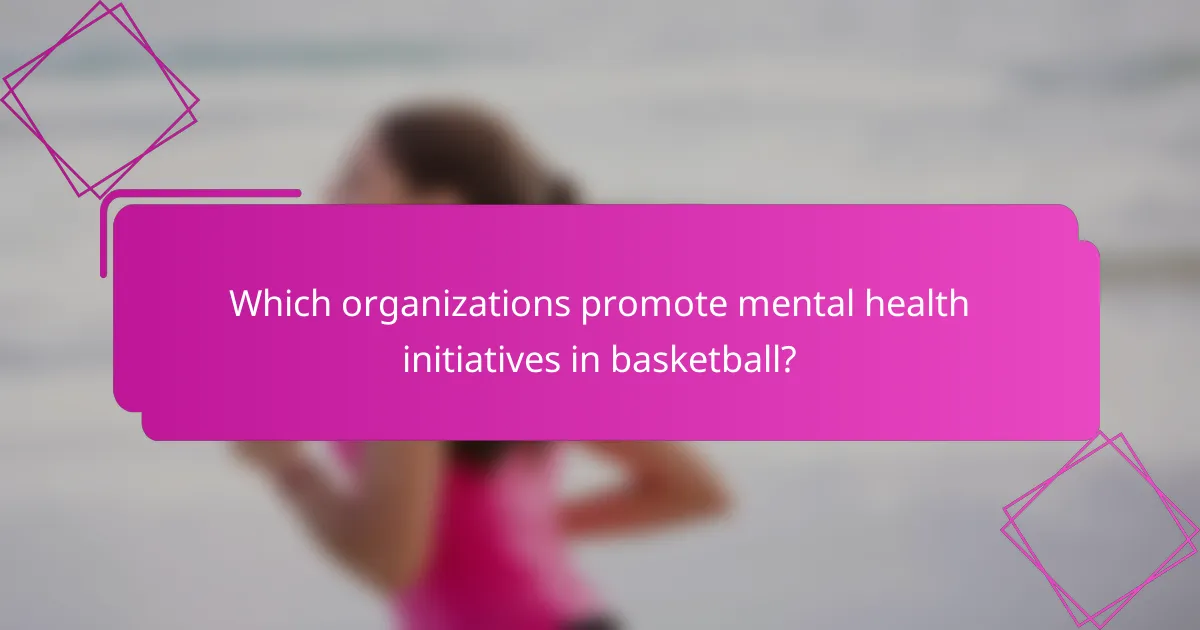
Which organizations promote mental health initiatives in basketball?
Organizations promoting mental health initiatives in basketball include the NBA, NCAA, and various mental health charities. These organizations focus on raising awareness, providing resources, and supporting players’ mental well-being. The NBA has established programs like “Mental Health Awareness Month” to educate players and fans. The NCAA offers mental health resources and support services for student-athletes. Charities such as the Mental Health Foundation collaborate with basketball leagues to promote mental wellness in the sport. These efforts aim to reduce stigma and enhance support systems within basketball communities.
How do local basketball leagues implement mental health programs?
Local basketball leagues implement mental health programs by integrating awareness initiatives, providing resources, and fostering supportive environments. These programs often include workshops, counseling services, and peer support groups tailored to players’ needs.
For instance, leagues may host mental health days, inviting professionals to speak on stress management and resilience. Additionally, they can create partnerships with local mental health organizations to ensure access to ongoing support. By prioritizing mental health, leagues promote well-being and enhance community engagement.
What role do professional teams play in mental health advocacy?
Professional teams play a crucial role in mental health advocacy by utilizing their platforms to raise awareness and reduce stigma. They engage in community outreach programs, host events, and collaborate with mental health organizations. These initiatives often include educational campaigns that inform players and fans about mental health resources.
For instance, teams frequently employ mental health professionals to support players and staff, promoting a culture of openness. This approach encourages discussions around mental health, which can lead to increased understanding and acceptance within the community. As a result, professional teams contribute significantly to the overall well-being of their fans and the broader society.
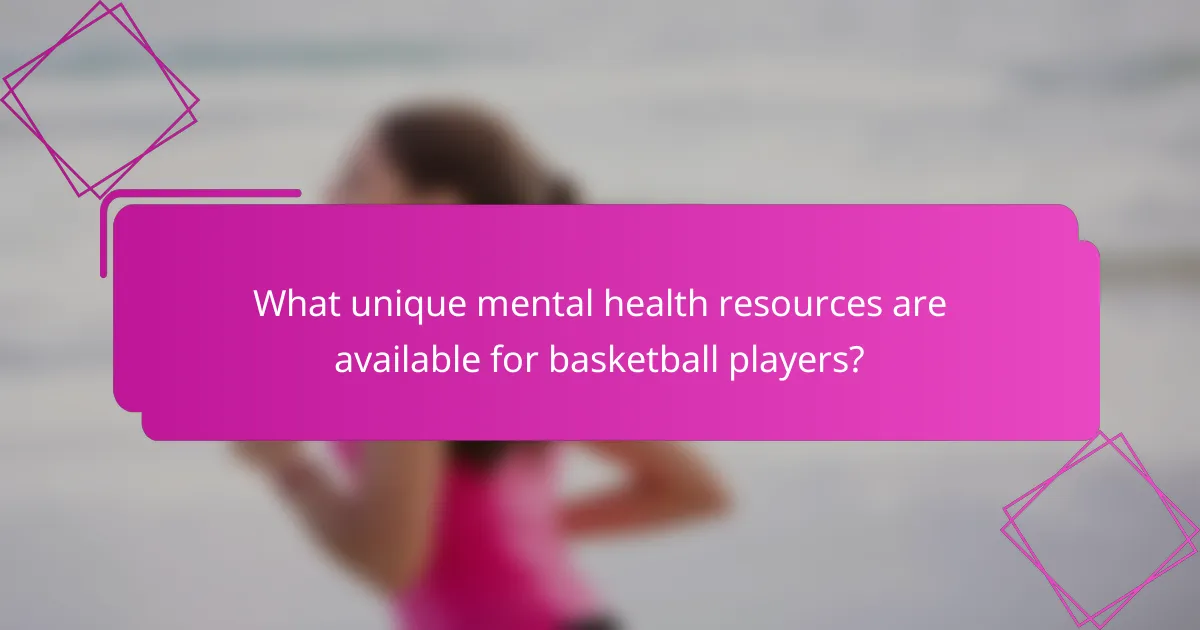
What unique mental health resources are available for basketball players?
Basketball players have access to unique mental health resources tailored to their needs. These include specialized counseling services, mental performance coaching, and peer support networks.
Organizations like the NBA and NCAA provide programs focused on mental wellness, aiming to reduce stigma and promote open discussions. Additionally, many teams employ sports psychologists to address mental health proactively.
Online platforms offer mental health apps designed specifically for athletes, providing tools for stress management and mindfulness. These resources empower players to prioritize mental health alongside physical training.
How can players access mental health support services?
Players can access mental health support services through various channels, including team resources, community organizations, and online platforms. Teams often provide access to sports psychologists or counselors who specialize in athlete mental health. Community organizations may offer workshops and support groups tailored for athletes. Online platforms provide anonymity and flexibility, allowing players to connect with mental health professionals remotely. These resources aim to promote mental wellness and provide necessary support within basketball communities.
Which mental health apps are popular among basketball communities?
Popular mental health apps in basketball communities include Headspace, Calm, and Moodfit. These apps offer mindfulness practices, stress management tools, and mood tracking features tailored for athletes. Many basketball players utilize these resources to enhance their mental resilience and overall well-being. Engaging with these apps can lead to improved focus and performance on the court.
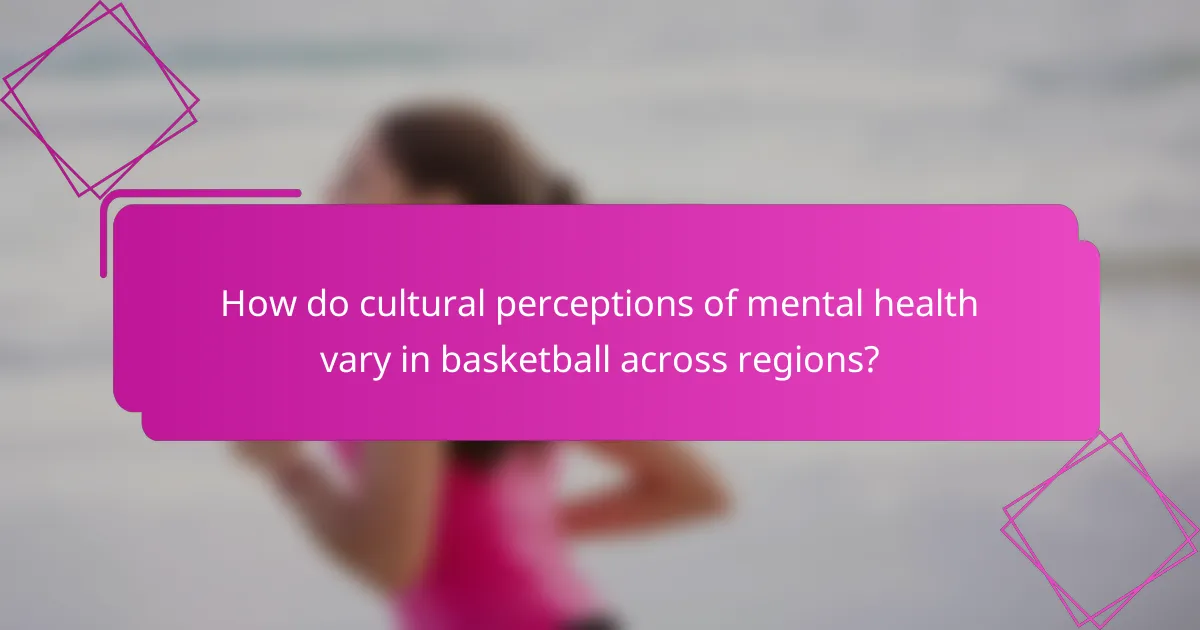
How do cultural perceptions of mental health vary in basketball across regions?
Cultural perceptions of mental health in basketball vary significantly across regions. In North America, mental health awareness is increasingly prioritized, with initiatives promoting open discussions among players. Conversely, in some Asian regions, stigma remains prevalent, leading to reluctance in addressing mental health issues.
In Europe, there is a growing recognition of mental health’s impact on performance, with teams integrating psychological support. African basketball communities often emphasize resilience and community support, viewing mental health through a collective lens.
These varying perceptions influence how players seek help, impacting their performance and overall well-being. Understanding these cultural differences is essential for fostering a supportive environment in basketball communities globally.
What are the differences in mental health awareness between amateur and professional basketball?
Amateur basketball often lacks the structured mental health support found in professional basketball. Professional athletes benefit from dedicated resources, including psychologists and wellness programs, while amateurs may rely on informal support networks. This disparity can affect mental health outcomes, with professionals more likely to prioritize mental well-being due to greater awareness and resources. Additionally, professional leagues actively promote mental health initiatives, raising awareness among players and fans alike. In contrast, amateur players may not have access to the same level of education on mental health issues.
How can regional events raise awareness about mental health in basketball?
Regional events can significantly raise awareness about mental health in basketball by creating community engagement and providing educational resources. These events foster open discussions, reduce stigma, and promote mental wellness among players and fans. For example, hosting workshops featuring mental health professionals can equip participants with coping strategies and resources. Additionally, showcasing personal stories from athletes can inspire others to prioritize their mental health. Engaging the local community through activities and partnerships amplifies the message, making mental health a shared responsibility within basketball culture.
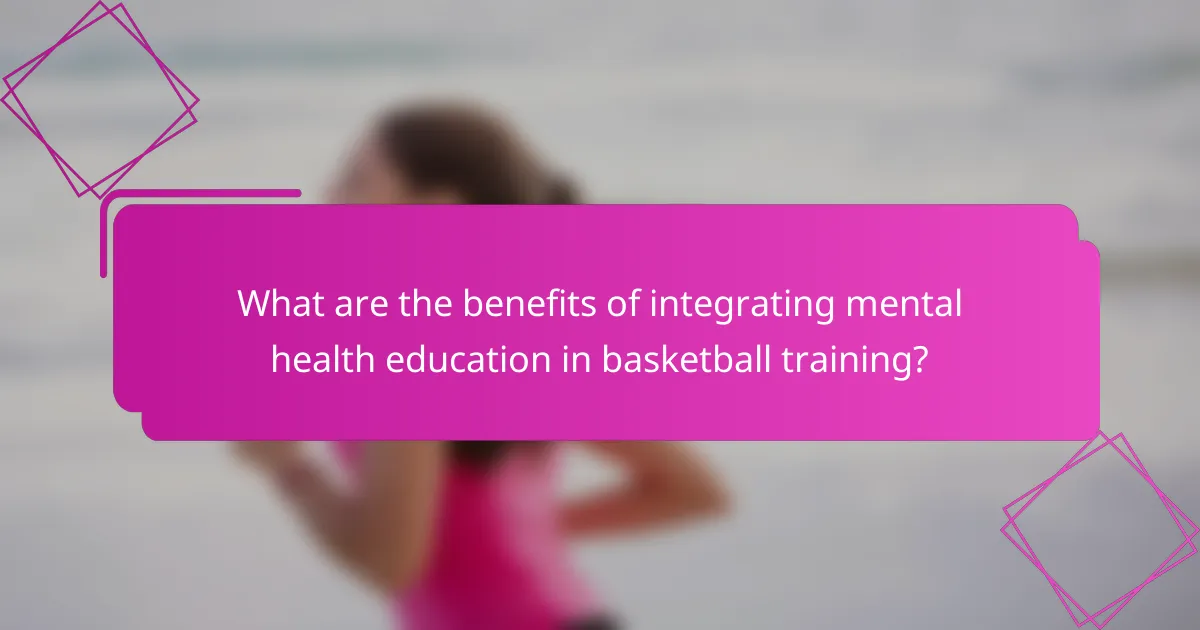
What are the benefits of integrating mental health education in basketball training?
Integrating mental health education in basketball training enhances player resilience and fosters a supportive community. This approach improves emotional regulation, reduces anxiety, and boosts overall performance. Research indicates that athletes with mental health awareness demonstrate greater focus and teamwork. Additionally, mental health education can lead to a decrease in stigma, encouraging players to seek help when needed. Ultimately, prioritizing mental well-being contributes to a healthier, more cohesive basketball environment.
How can coaches foster a supportive environment for mental health?
Coaches can foster a supportive environment for mental health by prioritizing open communication and creating a culture of trust. Encourage players to share their feelings and experiences, ensuring that they feel heard and valued.
Incorporate regular mental health check-ins, allowing athletes to discuss stressors or challenges. Educate players on mental health resources, promoting awareness and reducing stigma. Additionally, emphasize teamwork and camaraderie, as strong relationships can enhance emotional well-being.
By modeling vulnerability and resilience, coaches can demonstrate that mental health is as important as physical performance. This holistic approach cultivates a positive atmosphere where athletes thrive both on and off the court.
What training techniques can enhance mental resilience in players?
Mental resilience in players can be enhanced through various training techniques. Techniques such as mindfulness meditation improve focus and emotional regulation. Visualization exercises help players mentally rehearse successful performances, building confidence. Cognitive behavioral strategies teach players to challenge negative thoughts, fostering a positive mindset. Team-building activities promote social support, which is essential for resilience. Regular feedback sessions encourage growth and adaptability, reinforcing mental strength.
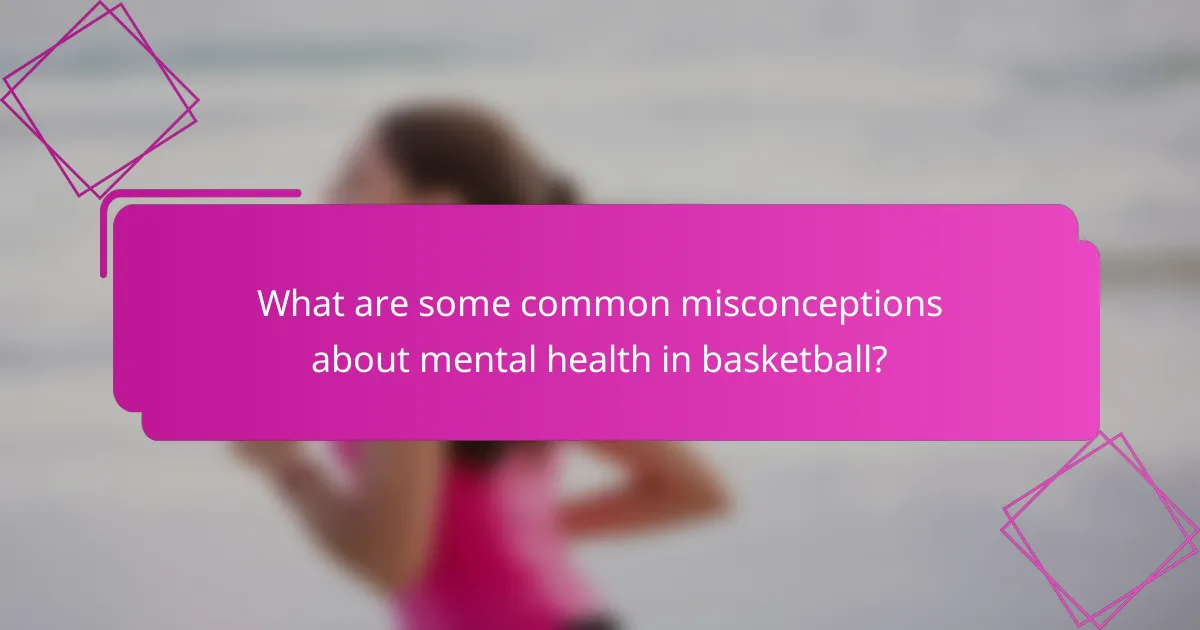
What are some common misconceptions about mental health in basketball?
Common misconceptions about mental health in basketball include the belief that mental toughness equates to a lack of vulnerability. Many players think discussing mental health is a sign of weakness, which can hinder their performance. Additionally, some believe that only elite athletes experience mental health issues, ignoring that stress and anxiety can affect players at all levels. Another misconception is that mental health problems are solely caused by on-court performance, while they can also stem from personal life challenges. Lastly, there is a notion that mental health support is unnecessary, although studies show that mental health awareness enhances team dynamics and player well-being.
How can misinformation about mental health be addressed in the sport?
Misinformation about mental health in basketball can be addressed through education, open dialogue, and supportive resources. Educating players, coaches, and fans on mental health issues fosters understanding and reduces stigma.
Promoting workshops and seminars led by mental health professionals can provide accurate information. Encouraging players to share their experiences creates a culture of openness. Establishing partnerships with mental health organizations can enhance access to resources.
Regularly featuring mental health topics in team communications keeps the conversation ongoing. This proactive approach can significantly improve mental health awareness and support within basketball communities.
What impact does stigma have on players seeking help?
Stigma significantly hinders players in basketball communities from seeking mental health support. It creates barriers, leading to feelings of isolation and shame. Players may fear judgment from teammates, coaches, and fans, which discourages them from addressing their mental health needs. As a result, many suffer in silence, impacting their performance and overall well-being. Addressing stigma through awareness and open conversations can foster a supportive environment, encouraging players to seek help without fear.
What best practices can basketball communities adopt to promote mental well-being?
Basketball communities can promote mental well-being by fostering open discussions about mental health, providing access to resources, and creating supportive environments. Encouraging players to share their experiences can reduce stigma and enhance community bonds. Regular workshops on coping strategies and stress management can equip individuals with essential skills. Additionally, integrating mental health professionals into training sessions can provide valuable support and guidance for athletes.
